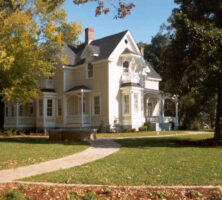The Watson-Brown Foundation, Inc., is a nonprofit Georgia corporation organized in 1970 by journalist and broadcast pioneer Walter J. Brown as a 501(c)(3) tax-exempt private foundation. Based in Thomson, it is one of the state’s largest private foundations, with liquid assets well in excess of $100 million. The Watson-Brown Foundation supports higher education by committing more than $1 million annually in college scholarships to qualified students from Georgia and South Carolina. The foundation also awards millions more in grants every year to southern institutions of higher education.

Courtesy of Watson-Brown Foundation, Inc.
Named for Thomas E. Watson and J. J. Brown, the Watson-Brown Foundation at inception was given a mission largely inspired by the Byrnes Foundation, the charitable legacy of James F. Byrnes, Walter J. Brown’s longtime colleague and friend. Walter Brown established his foundation primarily to provide college scholarships for underprivileged children. Like Byrnes, Brown stipulated that his foundation’s scholarship awards be conditioned upon merit and need. Brown directed trustees to consider applicants from farm backgrounds and rural areas.
Walter Brown also created the foundation to preserve the legacy of Thomas E. Watson. In 1925 Brown married one of Watson’s two granddaughters. Brown’s father, Georgia commissioner of agriculture J. J. Brown, was a friend and political ally of Watson’s. Through these relationships, Brown earned a profound respect and appreciation for Watson’s scholarship and agrarian advocacy.
Early actions of the foundation reflect Brown’s interest in historic preservation, especially of Watson-related memorabilia. In 1973 the foundation bought and restored the log cabin where Watson was born in 1856. Brown also maintained Watson’s first home: a National Historic Landmark, the restored Thomas E. Watson House today serves as the administrative headquarters for the Watson-Brown Foundation. Brown used Watson’s last home, Hickory Hill, as a private residence and weekend retreat. Fully restored, Hickory Hill today serves the mission of the Watson-Brown Foundation as both a house museum and a seminar venue for academics and scholars of the South.
Largely because of the restoration efforts of Brown, the Watson-Brown Foundation continues to support historic preservation with annual grants through an internal program that enlists the aid of talented high school students. As of 2003 the “Junior Board” of the Watson-Brown Foundation awards $25,000 in grants to worthy historic preservation projects in the Central Savannah River Area of Georgia and South Carolina.
Brown was never directly involved in the management of his foundation, but he gave it broad direction and funded it throughout his life. Brown died in 1995, and he bequeathed the majority of his estate to the foundation. From its headquarters in Thomson the foundation continues to operate its college scholarship program, to support higher education in the Southeast, and to encourage and fund responsible scholarship on the South.






